|
|
|
Sort Order |
|
|
|
Items / Page
|
|
|
|
|
|
|
| Srl | Item |
| 1 |
ID:
153862
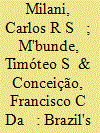

|
|
|
|
|
| Summary/Abstract |
Brazil's engagement in international development cooperation (IDC) is not new; however, governmental funding and interest in this agenda have grown since the adoption of the 1988 constitution, particularly during the mandates of the two Workers' Party (PT) presidents. Brazil's IDC refers to a broad range of practices including educational, scientific, financial, humanitarian and technical cooperation; in this article, we focus on Brazil's educational cooperation. Theoretically, the main argument advanced is that Brazil's official engagement in IDC can be considered as an expression of a ‘graduation dilemma’, the main concept around which this special themed section of the journal is organized. Historically, this article focuses on the period between 2003 and 2014, beginning with Lula da Silva's inauguration in his first presidential mandate and ending in the last year of Dilma Rousseff's first mandate. Empirically, we deal with the following questions: what is Brazil's contribution in the field of international development cooperation (IDC), particularly in respect of educational cooperation (IDC/ED)? And what are the norms and criteria driving Brazil's decisions in this field? This article is divided into three main sections: first, an overview of Brazil's IDC; second, a discussion of Brazilian IDC in the field of education; and third, a review of Brazil's educational cooperation with Portuguese-speaking African (PALOP) countries.
|
|
|
|
|
|
|
|
|
|
|
|
|
|
|
|
| 2 |
ID:
114227
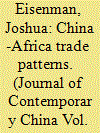

|
|
|
|
|
| Publication |
2012.
|
| Summary/Abstract |
China's trade patterns with African countries have made Beijing the focal point of new anti-Chinese resistance narratives in Africa. Unlike the Maoist era, when China's trade policies served its leaders' political goals, now they aim to access markets as part of China's larger domestic development strategy. China's state-run firms can channel China-Africa trade through extra-market decisions that influence flows, yet, ultimately, Beijing's ability to direct trade with Africa is constrained by market forces. Despite suggestions that shared illiberalism drives China-Africa trade the author concludes that five interrelated causal factors overwhelmingly determine China-Africa trade: China's comparative advantage in labor-intensive and capital-intensive production; Africa's abundant natural resource endowments; China's rapid economic growth; China's emphasis on infrastructure building at home and in Africa; and the emergence of economies of scale in China's shipping and light manufacturing sectors.
|
|
|
|
|
|
|
|
|
|
|
|
|
|
|
|
| 3 |
ID:
085848
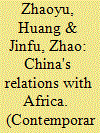

|
|
|
|
|
| Publication |
2009.
|
| Summary/Abstract |
The Sino-African relationship is one of the most important inter-continental relationships in the world.It is unique both in its origin and evolution and plays an important role on the world stage.
|
|
|
|
|
|
|
|
|
|
|
|
|
|
|
|
| 4 |
ID:
156429
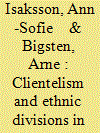

|
|
|
|
|
| Summary/Abstract |
This article investigates the commonly assumed link between ethnic divisions and clientelism in African politics by examining the role of contextual ethnic divisions and specific ethnic affiliations in shaping attitudes towards clientelism. The empirical findings, drawing on quantitative data for 38,293 survey respondents across 25 African countries suggest important country heterogeneity, but also highlight some regularities. In particular, the ethnic composition of the population in the area of residence, rather than the individual's own ethnic affiliation, is important in shaping support for clientelism. Individuals living in a region where the majority of the population is the president's co-ethnics tend to be more supportive of clientelism, regardless of their own ethnic affiliation. The wide coverage of the results makes them especially interesting; while a number of studies suggest ethnically based targeted transfers in specific sectors or settings, this study explores the links between different forms of ethnic divisions and support for clientelism in a large multi-country African sample.
|
|
|
|
|
|
|
|
|
|
|
|
|
|
|
|
| 5 |
ID:
153545
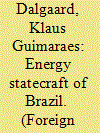

|
|
|
|
|
| Summary/Abstract |
This article evaluates the use of energy resources as instruments of foreign policy, herein termed “energy statecraft.” While most attention has been given to traditional energy resources such as oil and natural gas, few studies concern themselves exclusively with energy statecraft using renewable energy. The Brazilian case is unique because it is the only country to pursue energy statecraft with biofuels, and it does so through soft power, by encouraging mostly African countries to emulate its experience with biofuels. To inform this analysis, this study draws on the “conditionalist” approach in the economic statecraft literature to create a theoretical framework. While this approach establishes the conditions under which economic instruments of foreign policy are likely to be effective, this article applies these conditions to energy resources as foreign policy instruments, focusing on biofuels. However, the efficacy of energy statecraft cannot be fully understood without considering both the international context in which it takes place and the domestic context of target states. This article concludes that a theory of energy statecraft must consider three main factors: the conditions in the sender state, the domestic contexts of target states, and the international energy context.
|
|
|
|
|
|
|
|
|
|
|
|
|
|
|
|
| 6 |
ID:
105038
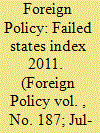

|
|
|
|
|
| Publication |
2011.
|
| Summary/Abstract |
The new edition of the index draws on some 130,000 publicly available sources to analyze 177 countries and rate them on 12 indicators of pressure on the state during the year 2010 -- from refugee flows to poverty, public services to security threats. Taken together, a country's performance on this battery of indicators tells us how stable -- or unstable -- it is. And the latest results show how much the 2008 economic crisis and its ripple effects everywhere, from collapsing trade to soaring food prices to stagnant investment, are still haunting the world.
|
|
|
|
|
|
|
|
|
|
|
|
|
|
|
|
| 7 |
ID:
133619
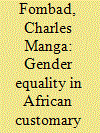

|
|
|
|
|
| Publication |
2014.
|
| Summary/Abstract |
The actual and perceived conflicts between customary law and human rights law, especially in issues dealing with gender equality, have remained a major challenge in Africa. Some of these conflicts are further complicated by the varying and contradictory interpretation of some customary laws by the courts. Different approaches have been adopted at different times and in different places to deal with some of these conflicts. One of the most controversial areas of customary law has been the traditional exclusion of women from property inheritance. This paper takes a critical look at how the courts in Botswana have dealt with the issue of the right to inherit the homestead or family home. It examines this issue in the specific context of the recent case of Ramantele v Mmusi in which the Court of Appeal had to consider the customary law rule of male ultimogeniture - which permits only the last-born son to inherit the homestead intestate to the exclusion of other siblings, especially females. It argues that courts need to be more proactive and progressive in their approach to dealing with such issues than they have been in the past in order to recognise the nature and extent of changes that are taking place today. The main lesson that can be drawn from the Botswana case is that if customary law is to survive and develop, more needs to be done to promote research and scholarship in this area and judges also need to take advantage of this research and deal with these customary law disputes with knowledge, understanding and sensitivity.
|
|
|
|
|
|
|
|
|
|
|
|
|
|
|
|
| 8 |
ID:
124515
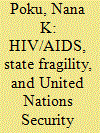

|
|
|
|
|
| Publication |
2013.
|
| Summary/Abstract |
When, in 2000, the United Nations Security Council (UNSC) discussed a global response to the growing HIV/AIDS pandemic, it was the first time in the institution's history that its members had debated a non-mandated issue. The preserve of this institution had, until then, been focused on preventing wars and the proliferation of weapons of mass destruction. Yet the mounting evidence on the societal impacts of HIV/AIDS was no less devastating for affected communities. In most heavily affected societies, the prevalence of HIV/AIDS doubled in less than ten years. But was the case that led to UNSC Resolution 1308 overstated? This article revisits the case that led to the Security Council meeting and argues that, far from being overstated, Resolution 1308 helped to avert a crisis of unimaginable proportions.
|
|
|
|
|
|
|
|
|
|
|
|
|
|
|
|
| 9 |
ID:
191830
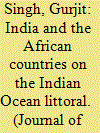

|
|
|
| 10 |
ID:
182428


|
|
|
|
|
| Summary/Abstract |
This study explores the drivers of security outcome convergence for 51 African countries spanning the period from 2000 to 2018. Phillips and Sul convergence club and system generalised method of moments (SGMM) estimation techniques were applied. The main findings suggest security outcome convergence, and this implies that African countries are characterised by similar factors (economic, developmental, geographic and governance) which in turn determine an idiosyncratic course of their paths for security policies. The study further confirms that African countries in general appear to have gradually chosen at least to some extent similar paths for their security measures. It is asserted that the economic, developmental, geographic and governance policies pursued by African governments – and the ability of these governments to shape their policies – are likely to impact the process of security outcome convergence in Africa.
|
|
|
|
|
|
|
|
|
|
|
|
|
|
|
|
| 11 |
ID:
130696
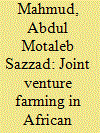

|
|
|
| 12 |
ID:
133023
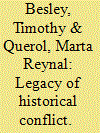

|
|
|
|
|
| Publication |
2014.
|
| Summary/Abstract |
This article exploits variation between and within countries to examine the legacy of recorded conflicts in Africa in the precolonial period between 1400 and 1700. There are three main findings. First, we show that historical conflict is correlated with a greater prevalence of postcolonial conflict. Second, historical conflict is correlated with lower levels of trust, a stronger sense of ethnic identity, and a weaker sense of national identity across countries. Third, historical conflict is negatively correlated with subsequent patterns of development looking at the pattern across grid cells within countries.
|
|
|
|
|
|
|
|
|
|
|
|
|
|
|
|
| 13 |
ID:
124509
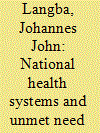

|
|
|
|
|
| Publication |
2013.
|
| Summary/Abstract |
This article examines challenges faced by the national health systems of African countries emerging from conflict in the provision of antiretroviral (ARV) medication and HIV/AIDS-related healthcare. It analyses resource profiles, the unmet need for antiretroviral medication, and progress in the provision of HIV/AIDS-related healthcare in Burundi, Liberia, Mozambique, Rwanda, Sierra Leone and Uganda, using data from the Global AIDS Response Progress Reports (GARPR) of 2011. Findings indicate that challenges to the health systems in post-conflict countries are immense and should not be underestimated, particularly in the context of HIV/AIDS. Policy recommendations for bolstering the performance of national health systems of post-conflict countries in the context of HIV/AIDS are proposed.
|
|
|
|
|
|
|
|
|
|
|
|
|
|
|
|
| 14 |
ID:
136079
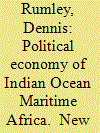

|
|
|
|
|
| Publication |
New Delhi, Pentagon Press, 2015.
|
| Description |
xiv, 322p.Hbk
|
| Standard Number |
9788182748071
|
|
|
|
|
|
|
|
|
|
|
|
Copies: C:1/I:0,R:0,Q:0
Circulation
| Accession# | Call# | Current Location | Status | Policy | Location |
| 058091 | 337.601824/RUM 058091 | Main | On Shelf | General | |
|
|
|
|
| 15 |
ID:
090679
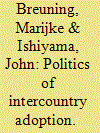

|
|
|
|
|
| Publication |
2009.
|
| Summary/Abstract |
What determines whether a country has more or less restrictive policies regarding intercountry adoption? Despite the growing importance of intercountry adoption as a political issue, and as an explicitly human face of globalization, there is virtually no systematic empirical work on intercountry adoption. We introduce a measure of the restrictiveness of the adoption laws in Sub-Saharan African countries and test possible explanations for the variations in legal restrictions on intercountry adoption among these countries.
Factors that are commonly cited as explanations for the restrictiveness of intercountry adoption policies do not hold up very well in our assessment. Openness to adoption is not determined by the severity of the orphan crisis or the AIDS crisis within the sending country, nor are democratic countries more responsive to the needs of their orphans. Additionally, African signatories to the Hague Convention, which aimed to increase transparency and accountability in intercountry adoption, tend to be among the most restrictive. On the other hand, a stronger connection with the global economy is associated with greater openness to intercountry adoption. We conclude with a discussion of the implications for orphans and for intercountry adoption.
|
|
|
|
|
|
|
|
|
|
|
|
|
|
|
|
| 16 |
ID:
120914
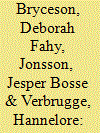

|
|
|
|
|
| Publication |
2013.
|
| Summary/Abstract |
Tanzania, along with several other African countries, is experiencing a national mining boom, which has prompted hundreds of thousands of men and women to migrate to mineral-rich locations. At these sites, relationships between the sexes defy the sexual norms of the surrounding countryside to embrace new relational amalgams of polygamy, monogamy and promiscuity. This article challenges the assumption that female prostitution is widespread. Using interview data with women migrants, we delineate six 'wifestyles', namely sexual-cum-conjugal relationships between men and women that vary in their degree of sexual and material commitment. In contrast to bridewealth payments, which involved elders formalising marriages through negotiations over reproductive access to women, sexual negotiations and relations in mining settlements involve men and women making liaisons and co-habitation arrangements directly between each other without third-party intervention. Economic interdependence may evolve thereafter with the possibility of women, as well as men, offering material support to their sex partners.
|
|
|
|
|
|
|
|
|
|
|
|
|
|
|
|
| 17 |
ID:
099561
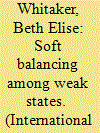

|
|
|
|
|
| Publication |
2010.
|
| Summary/Abstract |
Recent literature on the use of soft balancing to counter the hegemony of the United States has focused primarily on middle powers in Europe and rising powers such as China. But what about weak states? Do they simply go along with the hegemon, or do they challenge its policies despite the odds? And to what extent does the soft balancing argument explain their behaviour? In recent years, several historically friendly African countries have used non-military means to undermine the unilateral policies of the United States. Leaders in South Africa, Kenya, Nigeria, Tanzania, Mali, Namibia and Niger especially have resisted US demands in areas such as the 'war on terror', the International Criminal Court and the US Africa Command. This article seeks to explain the strategies of opposition that some African countries have pursued. It finds that the behaviour is driven both by regional power concerns and by domestic political considerations. Interestingly, public opinion in these relatively democratic countries is motivated by disagreements with US policy and by resentment of the predominance of American power. Thus, the evidence both confirms and challenges the notion of soft balancing. On one hand, the behaviour of African states is driven at least in part by the global balance of power-directly, as leaders respond to power concerns within the continent, and indirectly, as citizens pressure leaders to resist the hegemon. On the other hand, these findings challenge the underlying premise that state behaviour is determined solely by structural concerns. Instead, the oppositional behaviour of African states has both systemic and domestic explanations.
|
|
|
|
|
|
|
|
|
|
|
|
|
|
|
|
|
|
|
|
|